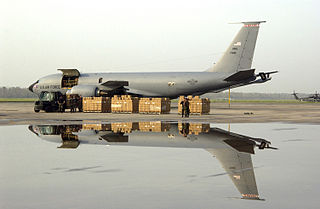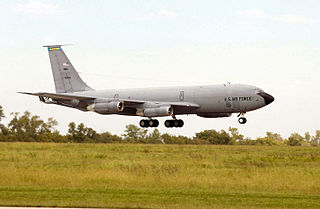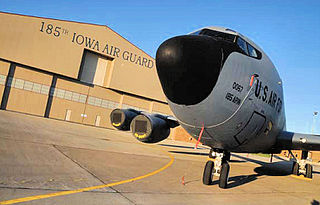
McConnell Air Force Base is a United States Air Force base located four miles (6 km) southeast of the central business district of Wichita, a city in Sedgwick County, Kansas, United States. The airbase was named in honor of the brothers Fred and Thomas McConnell of Wichita, who had both been Air Force pilots and veterans of World War II. It is the home of Air Mobility Command's 22d Air Refueling Wing, Air Force Reserve Command's 931st Air Refueling Wing, and the Kansas Air National Guard's 184th Intelligence Wing.

The 108th Wing is a unit of the New Jersey Air National Guard, one of the many units stationed at Joint Base McGuire-Dix-Lakehurst, New Jersey. If activated to federal service, the Wing is gained by the United States Air Force Air Mobility Command.

The Ohio Air National Guard is the aerial militia of the State of Ohio, United States of America. It is, along with the Ohio Army National Guard, an element of the Ohio National Guard.

The 155th Air Refueling Wing is a unit of the Nebraska Air National Guard, stationed at Lincoln Air National Guard Base, Nebraska. If activated to federal service, the Wing is gained by the United States Air Force Air Mobility Command.

The 121st Air Refueling Wing is a unit of the Ohio Air National Guard, stationed at Rickenbacker Air National Guard Base, Columbus, Ohio. If activated to federal service, the Wing is gained by the United States Air Force Air Mobility Command.

The 507th Air Refueling Wing is a reserve component flying unit of the United States Air Force. It is assigned to Fourth Air Force of Air Force Reserve Command, stationed at Tinker Air Force Base, Oklahoma with elements at Altus Air Force Base, Oklahoma. The 507th ARW executes air refueling, airlift, and training in support of Air Mobility Command and U.S. Strategic Command's national emergency war order requirements. The wing employs approximately 1,100 men and women made up of a mix of Traditional Reservists, full-time Air Reserve Technicians, AGRs and Air Force civilians. The wing also provides mission support for all other reserve units stationed at Tinker AFB.

The 134th Air Refueling Wing is a unit of the Tennessee Air National Guard, stationed at McGhee Tyson Air National Guard Base, Knoxville, Tennessee. If activated for federal service, the Wing is gained by the United States Air Force Air Mobility Command. The 134th Air Refueling Wing's KC-135 mission is to provide air refueling and airlift, as directed by the Secretary of Defense. It has been stationed at McGhee Tyson Airport since December 1957, though the ANG facility at the airport has been redesignated several times. Their radio callsign is "Soda"

The 126th Air Refueling Wing is a unit of the Illinois Air National Guard, stationed at Scott Air Force Base, Belleville, Illinois. If activated to federal service, the Wing is gained by the United States Air Force Air Mobility Command.

The 128th Air Refueling Wing is a unit of the Wisconsin Air National Guard, stationed at General Mitchell Air National Guard Base, Milwaukee, Wisconsin. If activated to federal service in the United States Air Force, the wing is operationally gained by the Air Mobility Command (AMC).

The 141st Air Refueling Wing is a unit of the Washington Air National Guard, stationed at Fairchild Air Force Base, Spokane, Washington. If activated to federal service, the 141 ARW is gained by the United States Air Force and assigned to the Air Mobility Command (AMC). As a result of BRAC action, the 141 ARW no longer has any unit-assigned aircraft and shares KC-135R aircraft with AMC's 92d Air Refueling Wing at Fairchild AFB.

The 186th Air Refueling Wing is a unit of the Mississippi Air National Guard stationed at Meridian Regional Airport, Mississippi. The 153d Air Refueling Squadron, assigned to the Wing's 186th Operations Group, was established on 18 August 1939 as the 153d Observation Squadron, one of the 29 National Guard observation squadrons formed before World War II.

The 190th Air Refueling Wing is a unit of the Kansas Air National Guard, stationed at Forbes Field Air National Guard Base, Topeka, Kansas. If activated to federal service, the Wing is gained by the United States Air Force Air Mobility Command.

The 127th Air Refueling Group is a unit of the Michigan Air National Guard, assigned to the 127th Wing, Selfridge Air National Guard Base, Michigan.

The Kansas Air National Guard is the aerial militia of the State of Kansas, United States of America. It is, along with the Kansas Army National Guard, an element of the Kansas National Guard.

The 174th Air Refueling Squadron is a unit of the Iowa Air National Guard 185th Air Refueling Wing. It is assigned to Sioux City Air National Guard Base, Iowa and is equipped with the KC-135R Stratotanker aircraft.

The 153d Air Refueling Squadron is a unit of the Mississippi Air National Guard 186th Air Refueling Wing located at Key Field Air National Guard Base, Mississippi. The 153d is equipped with the KC-135 Stratotanker aircraft.

The 117th Air Refueling Squadron is a unit of the Kansas Air National Guard 190th Air Refueling Wing located at Forbes Field Air National Guard Base, Topeka, Kansas. The 117th is equipped with the KC-135R Stratotanker.

The 127th Command and Control Squadron was a unit of the Kansas Air National Guard 184th Intelligence Wing stationed at McConnell Air Force Base, Wichita, Kansas. The 127th was a non-flying squadron operating the Distributed Common Ground System. The unit was inactivated on 29 September 2014.

The 163d Attack Wing is a unit of the California Air National Guard, stationed at March Joint Air Reserve Base, Riverside, California. If it were activated into federal service, elements of the Wing would be gained by the United States Air Force Air Combat Command and Air Education and Training Command.

Sioux City Air National Guard Base is a United States Air Force base, located at Sioux Gateway Airport It is located 7.2 miles (11.6 km) south-southeast of Sioux City, Iowa. On 25 May 2002, the airport was named "Colonel Bud Day Field" in honor of United States Air Force Colonel George Everette "Bud" Day, a Sioux City, Iowa native and is the only person ever awarded both the Medal of Honor and the Air Force Cross.


























